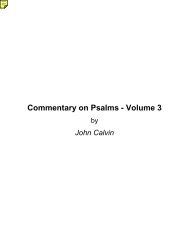The Dolorous Passion of Our Lord Jesus Christ. - documenta ...
The Dolorous Passion of Our Lord Jesus Christ. - documenta ...
The Dolorous Passion of Our Lord Jesus Christ. - documenta ...
You also want an ePaper? Increase the reach of your titles
YUMPU automatically turns print PDFs into web optimized ePapers that Google loves.
<strong>The</strong> <strong>Dolorous</strong> <strong>Passion</strong> <strong>of</strong> <strong>Our</strong> <strong>Lord</strong> <strong>Jesus</strong> <strong>Christ</strong>.Anne Catherine Emmerichthou been for so many years unknown? Answer my questions? Art thou a king? Thy appearancecertainly is not regal. I have been told that thou wast conducted to the Temple in triumph a shorttime ago. What was the meaning <strong>of</strong> such an exhibition?—speak out at once!—Answer me!’197Herod continued to question <strong>Jesus</strong> in this rapid manner; but our <strong>Lord</strong> did not vouchsafe a reply. Iwas shown (as indeed I already knew) that <strong>Jesus</strong> was thus silent because Herod was in a state <strong>of</strong>excommunication, both on account <strong>of</strong> his adulterous marriage with Herodias, and <strong>of</strong> his havinggiven orders for the execution <strong>of</strong> St. John the Baptist. Annas and Caiphas, seeing how indignantHerod was at the silence <strong>of</strong> <strong>Jesus</strong>, immediately endeavoured to take advantage <strong>of</strong> his feelings <strong>of</strong>wrath, and recommenced their accusations, saying that he had called Herod himself a fox; that hisgreat aim for many years had been the overthrow <strong>of</strong> Herod’s family; that he was endeavouring toestablish a new religion, and had celebrated the Pasch on the previous day. Although Herod wasextremely enraged at the conduct <strong>of</strong> <strong>Jesus</strong>, he did not lose sight <strong>of</strong> the political ends which he wishedto forward. He was determined not to condemn our <strong>Lord</strong>, both because he experienced a secret andindefinable sensation <strong>of</strong> terror in his presence, and because he still felt remorse at the thought <strong>of</strong>having put John the Baptist to death, besides which he detested the High Priests for not havingallowed him to take part in the sacrifices on account <strong>of</strong> his adulterous connection with Herodias.But his principal reason for determining not to condemn <strong>Jesus</strong> was, that he wished to make somereturn to Pilate for his courtesy, and he thought the best return would be the compliment <strong>of</strong> showingdeference to his decision and agreeing with him in opinion. But he spoke in the most contemptuousmanner to <strong>Jesus</strong>, and turning to the guards and servants who surrounded him, and who were abouttwo hundred in number, said: ‘Take away this fool, and pay him that homage which is his due; heis mad, rather than guilty <strong>of</strong> any crime.’198<strong>Our</strong> <strong>Lord</strong> was immediately taken into a large court, where every possible insult and indignity washeaped upon him. This court was between the two wings <strong>of</strong> the palace, and Herod stood a spectatoron a platform for some time. Annas and Caiphas wore by his side, endeavouring to persuade himto condemn our Saviour. But their efforts were fruitless, and Herod answered in a tone loud enoughto be heard by the Roman soldiers: ‘No, I should act quite wrongly if I condemned him.’ Hismeaning was, that it would be wrong to condemn as guilty one whom Pilate had pronouncedinnocent, although he had been so courteous as to defer the final judgment to him.When the High Priests and the other enemies <strong>of</strong> <strong>Jesus</strong> perceived that Herod was determined not togive in to their wishes, they dispatched emissaries to that division <strong>of</strong> the city called Acre, whichwas chiefly inhabited by Pharisees, to let them know that they must assemble in the neighbourhood<strong>of</strong> Pilate’s palace, gather together the rabble, and bribe them to make a tumult, and demand thecondemnation <strong>of</strong> our <strong>Lord</strong>. <strong>The</strong>y likewise sent forth secret agents to alarm the people by threats <strong>of</strong>the divine vengeance if they did not insist on the execution <strong>of</strong> <strong>Jesus</strong>, whom they termed a sacrilegiousblasphemer. <strong>The</strong>se agents were ordered likewise to alarm them by intimating that if <strong>Jesus</strong> were notput to death, he would go over to the Romans, and assist in the extermination <strong>of</strong> the Jewish nation,for that it was to this he referred when he spoke <strong>of</strong> his future kingdom <strong>The</strong>y endeavoured to spreada report in other parts <strong>of</strong> the city, that Herod had condemned him, but still that it was necessary forthe people likewise to express their wishes, as his partisans were to be feared; for that if he werereleased he would join the Romans, make a disturbance on the festival day, and take the most113
















